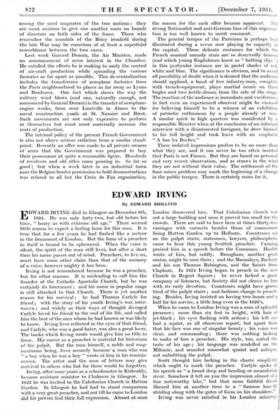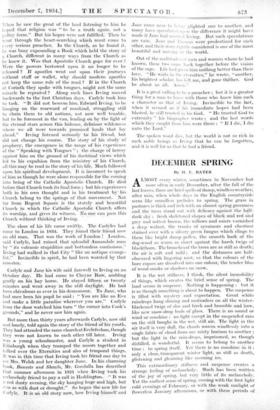EDWARD IRVING
By EDWARD SHILLITO
EDWARD IRVING died in Glasgow on December 8th, 1834. He was only forty-two, but old before-his time, " hoary as. with extreme old age." There seemed little reason to expect a lasting fame for this man. It is true that for a few -years he . had, flashed like a meteor in the firmament of London. But the fame of a preacher in itself is bound to be ephemeral. When the voice is silent, the spirit of the man still lives, but after a short time his name passes out of mind. Preachers, to live on, must have some other claim than that of the memory of a voice, however mighty it has been.
Irving is not remembered because he was a preacher, but for .other reasons. It is misleading to call him the "founder of the Catholic 'Apostolic Church; but he was certainly its forerunner ; and his name in popular usage is still attached to that Church. There is yet another reason for his survival ; he had Thomas Carlyle for friend ; with the story of his youth Irving's was inter- oven ; and widely as their ways of thought diverged Carlyle loved his friend to the end of his life, and called him the.best of the men whom he had known or was likely to know. Irving lives reflected in the eyes of that friend, and Carlyle, who was a good hater,. was also a great lover. The books which Irving wrote would give. him no title to .fame. His career as a preacher is material for historians of the pulpit. But the man himself, .a noble. and mag- nanimous being, lives securely becausea man who was " a boy when he was a boy " wrote of him in his reminis- cences. The artist and the man of letters. may give survival to others who but for them would be forgotten.
Irving, after some years'as a schoolmaster in Kirkcaldy, became assistant minister to Chalmers in Glasgow. In 1822 he Was invited to the Caledonian Church in Hattcin ' Garden. In Glasgow he had had to stand comparison with a very great preacher, and not till he came to LoAdon 'did 'his p6teri' find-their full'eXpression. AlmoSt at- once London discovered him. That Caledonian church was not a large building and soon it proved too small for the crowds. There are said to have been at times thirty-five carriages with coronets besides those of commoners lining Hatton Garden up to Holborn. Countesses sat on the pulpit stairs, statesmen, lawyers, philosophers, came to hear this young Scottish preacher. Canning praised him in a speech before the Commons. Hazlitt wrote of him,. but coldly. Brougham, another great orator, might be seen there ; and the Macaulays, Zachary and his son Thomas Babington, and the Saints from Clapham. In 1824 Irving began to preach in the new Church in Regent Square ; he never lacked a great company of listeners, but Society did not cleave to him with its early devotion. Countesses might have grown tired of the pulpit stairs ; and fashions change in preach- ing. Besides, Irving insisted on having two hours and a half for his service,. a little long even in the 1820's.
When he came to London Irving was a man of splendid presence ; more than six feet in height, with hair of jet-black ; his eyes flashing with ardour ; his left eye had a squint, as all observers report, but apart from that his face was one of singular beauty ; his voice was clear, and- commanding ; there was nothing lacking to make of him a. preacher. His style, too, suited the taste of his age ; his language was modelled on the Miltonic, and sounded somewhat quaint and antique, not unbefitting the pulpit.
Scott thought him lacking in the chaste simplicity which ought to mark the preacher. Carlyle spoke of his speech as " a broad deep and bending or meandering river.- Somehow it left on you the impression almost of a fine noteworthy lake," but that same faithful friend likened him at another time to a " Samson heavily striding along with the gates of Gaza on his shoulders." - Irving was never satisfied in his London ministry. When he saw the great of the land listening to him he hoped that religion was " to he a truth again, not a paltry form." But his-hopes were not fulfilled: Then he went through the heart-searching whieh must come to every serious preacher. In the Church, as he found it, he was busy expounding a Book which held the story of a Church, different in many ways from the Church as he knew it. Was -that Apostolic Church gone for ever ? Were the powers bestowed upon it no longer to be released ? If apostles went out upon their journeys without staff or wallet, why should modern- apostles not keep the same rule of the road ? If in the Church at Corinth they spoke with tongues, might not the same miracle be repeated ? Along such lines Irving moved backwards to the-first Christian days. Carlyle took him to task. "It did not beseem him, Edward Irving.to be hanging on the rearward of mankind, *struggling still to chain them to old notions, not now' well tenable, but to be foremost in the .van, leading on by the light of the eternal stars across this hideous, deliriOuS wilderness where we all were towards promised lands that lay ahead." Irving- listened seriously to his friend, but did not change his course. The story of his study of prophecy, the emergence in the range Of his 'experience of the " Speaking with Tongues " ; the charge of heresy against him on the ground of his doctrinal views which led to his expulsion from the Ministry Of his Church, all this may he read in the story of his life. Much followed Upon his spiritual developinent. It is incorrect to Speak of him as though he were aloneiesponsible for ihe coming into being of the Catholic Apostolic Church. He died before that Church took its final form ; but his experiences both in his own thought and in his treatment by his. Church belong to the springs of that movement. Not far from Regent Square is the stately and beantiful Church in which the Catholic Apostolic. Church • offers its worship, and gives its witness. XOione can pass this Church without thinking of Irving.
The close of his life came swiftly. The Carlyles had come to London in 1834. They found their friend now an old man. That was the work of London ! London, said Carlyle, had ruined that splendid' Annandale man by " its volcanic stupidities and bottomless confusions." Irving had walked in that City " like an antique evange- list." Invincible in spirit, he had been worsted by that monster.
Carlyle and Jane his wife said farewell to Irving on an October day. He had come to Cheyne Row, ambling gently on his bay horse. He stayed fifteen or twenty minutes and went away in the still daylight. He had been chivalrous as ever in his demeanour. To Jane, who had once been his pupil he said: " You are like an .Eve and make a little paradise wherever you are." . Carlyle from the door watched him turn " the corner into Cook's grounds," and he never saw him again.
But more than thirty years afterwards Carlyle, now old and lonely, told again the story of the friend of his youth. They had attended the same church at Ecclefechan, though they were not known to each other till later. Irving was a young schoolmaster, and Carlyle a student in Edinburgh when they tramped the moors together and talked over the Eternities and also of temporal things. It was in this time that Irving took his friend one day to see Mrs. Welsh and her daughter Jane. In_ his charming book, Bonnets and Shawls, Mr. Guedalla has described that summer afternoon in 1821 when Irving. took . his melancholy friend to pay a call in Haddington.. ".It was a red dusty evening, the sky hanging huge and high,•hilt dun as with dust or drought." So began the new life for . Carlyle. It is an old story now, how Irving himself and Jane came near to being plighted one to another, and many have speculated upon the difference it might have made if Jane had married Irving. But such speculations are vain. Jane and Thomas were predestined for each other, and their story rightly considered is one of the Most beautiful and moving in the world.
Out of the multitudes of men and women whom he had known, these two came back together before the vision of the sage. Life had given him nothing better than their love. "He waits in the eternities," he wrote, "another, his brightest scholar. has left me, and gone thither'. God be about us all. Amen."
It is a great calling to be a preacher ; but it is a greater thing for a man to leave with those who knew him such a character as that of Irving. Invincible to the last, when it seemed as if his immediate hopes had been blasted, he still trusted in his God. " He trusted God to extremity " his biographer wrote ; and the last words which they caught from him were these : " If I die, I die unto the Lord."
The spoken word dies, but the world is not so rich in such noble beings as Irving that he can be forgotten, and it is well for us that he had a friend.



















































 Previous page
Previous page